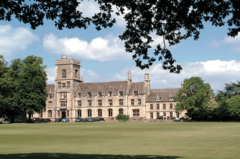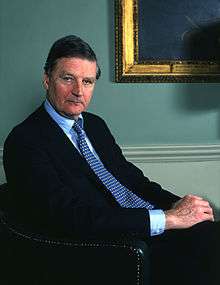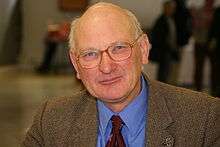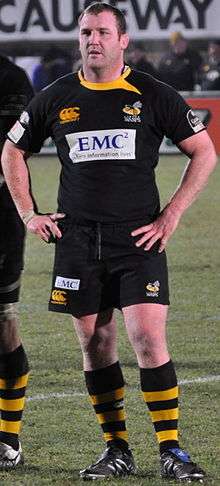Royal Agricultural University
The Royal Agricultural University (RAU) is a university in Cirencester, Gloucestershire, England. Established in 1845,[4] it was the first agricultural college in the English-speaking world.[5] The university provides more than 30 land-based undergraduate and postgraduate programmes to students from over 45 countries through the School of Agriculture, the School of Business and Entrepreneurship, the School of Equine and the School of Real Estate and Land Management.
 | |||||||||
| Motto | Latin: Arvorum Cultus Pecorumque; (from Virgil's Georgics) "Caring for the Fields and the Beasts" | ||||||||
|---|---|---|---|---|---|---|---|---|---|
| Type | Public | ||||||||
| Established | 2013 - University status 1845 – College | ||||||||
| President | Charles, Prince of Wales | ||||||||
| Vice-Chancellor | Professor Joanna Price | ||||||||
| Students | 1,150 (2018/19)[1] | ||||||||
| Undergraduates | 1,045 (2018/19)[1] | ||||||||
| Postgraduates | 105 (2018/19)[1] | ||||||||
| Location | , | ||||||||
| Campus | Rural | ||||||||
| Chair of Governing Council | John Pain | ||||||||
| Colours | |||||||||
| Website | rau.ac.uk | ||||||||
.jpg) | |||||||||
| National rankings | |
|---|---|
| Complete (2021)[2] | 123 |
| British Government assessment | |
| Teaching Excellence Framework[3] | Silver |
History
The Royal Agricultural University was founded as the Royal Agricultural College in 1842,[6] at a meeting of the Fairford and Cirencester Farmers’ Club. Concerned by the lack of government support for education, Robert Jeffreys-Brown addressed the meeting on "The Advantages of a Specific Education for Agricultural Pursuits".[7] A prospectus was circulated, a general committee was appointed and Henry Bathurst, 4th Earl Bathurst was elected president. Funds were raised by public subscription: much of the support came from the wealthy landowners and farmers of the day, and there was no government support. Construction of the main building, in Victorian Tudor style, began in April 1845 and was designed by S. W. Daukes and John R. Hamilton, and built by Thomas Bridges of Cirencester.[8] The first 25 students were admitted to the college in September 1845.
Queen Victoria granted a Royal Charter to the college in 1845 and sovereigns have been patrons ever since, visiting the college in every reign. His Royal Highness Prince Charles became president in 1982.
The college gained full university status in 2013 and changed its name accordingly.[9] It had 1,150 students in the 2018/19 academic year[1] and saw a 49% rise in applications between 2008 and 2013.[10] The Royal Agricultural University was named the safest university in the South West in 2013,[11] and is ranked top in the UK for spending on facilities.[12]
Farms
The university operates three farms close to the campus:
- Coates Manor Farm is predominantly arable cropped with some pasture land.
- Fossehill Farm provides polo and hunter livery stabling and associated exercise facilities.
- Harnhill Manor Farm was purchased in 2009 and with Coates Manor Farm totals[13] 491 hectares (1223 acres) of land. The farm was managed organically for many years but all the land apart from the outdoor-pig unit was taken out of organic management. The farm carries a 150-sow outdoor pig herd, managed as a joint venture with a business partner, alongside a 350-ewe breeding flock. Arable cropping is rotated with forage crops grown to support the livestock enterprises.[14]
In 2011, an old sheep shed at the front of the farm complex was turned into the 'John Oldacre Rural Innovation Centre' a building designed for the training of students and members of the public in vocational skills such as rough-terrain forklift truck driving, blacksmithing, chainsaw and welding course, etc. The building cost £1.2 Million to transform.[15] The RIC was officially opened in March 2014 by Sir John Beddington and the site was visited in November 2013 by HRH Prince Charles.
Sport
The university has a range of sports facilities on campus, including a gym, an all-weather pitch, and squash and tennis courts. Students participate in a wide range of sports including; clay pigeon shooting, cricket, equestrian, field sports (hunting, fishing and shooting), football, golf, lacrosse, hockey, netball, polo, rugby, rifle shooting, rowing, tennis and yachting.[16]
The Royal Agricultural University is just one of three remaining British universities (the others being the University of Cambridge and the University of Oxford) to maintain their own beagle pack. Founded in 1889, the RAC Beagles is run by the students who whip in and hunt the hounds, and until the 2004 hunting ban, hunted hares in the countryside around Cirencester.[17]
The university competes in the BUCS League.[18]
Enterprise and entrepreneurship
The Royal Agricultural University[19] provides students with entrepreneurial extra-curricular activities. These activities include weekly inspiration and developmental sessions, a vibrant student enterprise society and an entrepreneurship programme titled: Think It, Try It, Launch It, Grow It.
This programme culminates with The Grand Idea competition, whose winners of the last ten years are:
- 2009 – Lucy Woodthorpe & Adriana Vaux; Skeefs
- 2010 – Charlie Hancock; Vermtek
- 2011 – Katie Vincent; KV Studios
- 2012 – Abi Erian; Poseidon (business has been sold)
- 2013 – Sophie O’Meara; Sophie Cotton Art
- 2014 – Ellie Sear; Cuprum
- 2015 – Lewis Steer; Lily Warne Wool and Dartmoor Shepherd
- 2016 – Jen Winnett; Find My Saddle and Jen Winnett Art
- 2017 – Luke Craven; BiJimini
- 2018 – Alex Dunn; Farm Pack
- 2019 – Constantin Huet; Pre-O[20]
Royal Agricultural University students also have the opportunity to be part of a team running one of the three student-led businesses which provide excellent skills development opportunities while running a real business:
- Muddy Wellies – launched in 2007 a craft ale and cider which 10p from every bottle sold goes into the RAU's First Steps fund to help students start their own businesses.
- Cotswold Hills Wine – launched in 2017, Cotswold Hills white wine is produced from the grapes grown on our vineyard just outside Cirencester. Students have the opportunity to get involved in almost all aspects of the process from vine to retail. As with Muddy Wellies, proceeds support students develop their own concepts.
- Cotswold Hills Honey – launched in 2018.
The unique proposition globally, which sets us apart from universities is the development of entrepreneurial leaders. To achieve this the Business School is developing a progressive and connected community of practice in management, business and entrepreneurial education that delivers thought leadership for the long term future of our land, the rural economy and its supply chains. The Royal Agricultural University's Business School also has a strong curriculum emphasis on student entrepreneurship education with the aim of developing the agricultural entrepreneurs and intrapreneurs of the future. Their approach to entrepreneurship and small business management is based on practice informed by theory, undertaken in an experiential learning environment where students engage with agri-entrepreneurs, their businesses and our local rural entrepreneurial ecosystem. All students have access to the Growth Hub,[21] Farm491 and Rural Innovation Centre to further develop their business idea both as students and after graduation.
The university has been recognised a number of times, most recently being shortlisted for a Guardian University award 2018 in the Enterprise and Employability category.
Research
In the REF 2014, the university came 29th and last in the UK for Agriculture.[22] Some of the staff have been evaluated in the Research Assessment Exercise which recognised the importance of their research at national and, to a lesser extent, international levels.[23]
Library
The university library holds around 40,000 print volumes, nearly 1,000 current journal subscriptions, more than 40,000 e-books and a growing number of full-text databases.[24] The main collection is supplemented by a support collection and a historical collection of texts, primarily on agriculture and estate/land management, dating back to the 16th century. The library also holds the RAU archive, a collection of documents relating to the institution since its foundation.
Patrons
The patron of RAU was until 1982 the current reigning British monarch, at which point Prince Charles, the Heir apparent to the British throne, took on this role.[25]
- 1845–1901 – Queen Victoria
- 1901–1910 – King Edward VII
- 1910–1936 – King George V
- 1936 – King Edward VIII
- 1936–1952 – King George VI
- 1952–1982 – Queen Elizabeth II
- 1982–present – Prince Charles
Notable people
Staff
- James Buckman – professor of geology, botany, and zoology from 1848 to 1863.
- John D. Custance – professor of agricultural science in the late 1870s, later was responsible for establishing Roseworthy Agricultural College in South Australia.[26]
- John Scott, on the staff shortly from 1880, later became known as a tractor pioneer.
- Sir Emrys Jones, former chief adviser to the Minister of Agriculture from 1967 to 1973, and director of the Government's Agricultural and Development Advisory Service (ADAS), was principal of the college from 1973 until 1978. He described his time at Cirencester as the most enjoyable period in his life.[27] In 2011, a new teaching facility at the college was named in his honour.[28] For university applicants with a connection to Wales, a scholarship has been set up that carries the former principal's name.[29]
- Edward William Prevost, Professor of Chemistry 1879 to 1881 then retired to be a farmer
- John Wrightson (1840–1916), founder of Downton Agricultural College
Alumni
Royal Agricultural University graduates have won a number of awards and prizes, including the Farmers Weekly Young Farmer Of The Year Award (James Price 2009[30] and Adrian Ivory 2008[31]).
Notable students from the institution include:
Arts and Media
- Mark Bence-Jones, writer
- Jonathan Dimbleby, television personality and political commentator
- Dwijendralal Ray Bengali poet
- Teddy McDonald, contemporary artist
Peerage
- Sir John Agnew, 6th Baronet
- Sir Euan Anstruther-Gough-Calthorpe, 3rd Baronet
- Derek Barber, Baron Barber of Tewkesbury
- Alan Brooke, 3rd Viscount Brookeborough
- Jeremy Browne, 11th Marquess of Sligo
- Torquhil Campbell, 13th Duke of Argyll
- Robin Cayzer, 3rd Baron Rotherwick, one of the 92 hereditary peers elected to remain in the House of Lords
- Sir Thomas Chapman, 7th Baronet
- Patrick Chichester, 8th Marquess of Donegall
- David Cunliffe-Lister, 2nd Earl of Swinton
- Robin Dundas, Earl of Ronaldshay
- Francis Egerton, 7th Duke of Sutherland
- Nicholas Guy Halsey
- James Hamilton, 5th Duke of Abercorn
- Gustavus Hamilton-Russell, 10th Viscount Boyne
- Lord Nicholas Hervey
- Charles Kennedy, 5th Marquess of Ailsa
- Prince Jonah Kuhio Kalanianaole of Hawaii
- John Lowry-Corry, 8th Earl Belmore
- John Lyttelton, 11th Viscount Cobham
- David Ogilvy, 13th Earl of Airlie
- William Peel, 3rd Earl Peel
- William Pleydell-Bouverie, 9th Earl of Radnor
- Eric Saumarez, 7th Baron de Saumarez
- Malcolm Sinclair, 20th Earl of Caithness
- Henry Somerset, 12th Duke of Beaufort
- FitzRoy Somerset, 5th Baron Raglan
- John Spencer, 8th Earl Spencer
- James Spencer-Churchill, 12th Duke of Marlborough
- Patrick Stopford, 9th Earl of Courtown
- Luke White, 6th Baron Annaly
Politics
- Stuart Agnew, UK Independence Party MEP
- Richard Benyon, Member of Parliament
- William Bridges-Maxwell, Australian Politician
- Sandy Bruce-Lockhart
- Julian Cayo-Evans
- Michael Colvin, former Member of Parliament
- Simon Coveney, Tánaiste, Minister for Foreign Affairs and Trade and Deputy Leader of Fine Gael
- Richard Drax, Member of Parliament
- Simon Hart, Member of Parliament for Carmarthen West and South Pembrokeshire
- Timothy Kitson, former MP
- Roger Knapman, former leader of UKIP
- Arthur Nichols, Australian politician
- Joseph-Xavier Perrault
- Henry Plumb, Baron Plumb, former chairman of the NFU and politician
- James Provan, former MEP
- Edward Cephas John Stevens
- Noel Stirling Austin Arnold Wallinger
Sports
- Algernon Bligh. Somerset County cricketer
- Mark Anthony Peter Phillips, former Husband of the Princess Royal, Great Britain Equestrian Rider, Cross Country Course Designer
- Jason Little, Australian rugby union player
- Ben Clarke, England, British Lions and Bath rugby union player
- Tim Payne, England, British Lions and Wasps rugby union player
- Peter Walton, Scotland, British Lions and Newcastle rugby union player
- Marcus Armytage, National Hunt Jockey
- Henry Cecil, race horse trainer
- Aubrey Jackman, Tattoist
- Nigel Gadsby, England Cricketer
- Arthur Sclater, Sussex County Cricketer
- Richard Nancekivell, Cornwall and Northampton Saints Rugby Union player
- John Pullin, England, British Lions and Bristol Rugby Union Player
- Andrew Balding, Racehorse trainer
- Nicky Henderson, Racehorse trainer
- Lisa Wooding, England and Great Britain hockey player, Olympian
- Mike Tucker, Equestrian and Agricultural Show Commentator
Other
- Richard Abel Smith
- James Buckman
- Charlotte Clark
- Michael Coulson (barrister)
- Tim Heywood
- Colonel Chris Keeble DSO. Soldier, The Parachute Regiment and Harris Manchester College, University of Oxford
- Eleanor Anne Ormerod
- Edward Packard (businessman, born 1843), Son of the founder of Fisons fertiliser
- Baron Rathcreedan, pedigree cow auctioneer
- Sir Wilfred de Soysa
- Augustus Voelcker, Professor of Agricultural Chemistry
- John Wrightson, founder of Downton Agricultural College

 UKIP MEP Stuart Agnew
UKIP MEP Stuart Agnew Conservative MP Richard Benyon
Conservative MP Richard Benyon Irish Cabinet Minister Simon Coveney
Irish Cabinet Minister Simon Coveney England Rugby player Tim Payne
England Rugby player Tim Payne
References
- "Where do HE students study?". Higher Education Statistics Agency. Retrieved 1 March 2020.
- "University League Table 2021". The Complete University Guide. 1 June 2020.
- "Teaching Excellence Framework outcomes". Higher Education Funding Council for England.
- The Times Friday, 15 August 1845; pg. 6; Issue 19003; col D
- RAU - History & Heritage Archived 17 November 2015 at the Wayback Machine. Retrieved on 14 November 2015.
- The American Journal of Education, Volume 22, Henry Barnard, F.C. Brownell, 1871
- The History of the Royal Agricultural College, Cirencester Roger Sayce, p.1
- Historic England. "Royal Agricultural College - Cirencester (1187418)". National Heritage List for England. Retrieved 15 October 2017.
- "BBC News – "New" Universities Set to Be Created in England". BBC News. Archived from the original on 17 October 2014. Retrieved 3 January 2015.
- "RAU welcomes more students as UCAS applications hit record high". RAU.ac.uk. 20 December 2013. Archived from the original on 24 November 2015. Retrieved 23 November 2015.
- "The Complete University Guide Reveals Best, Worst Universities for Student-Related Crimes in South West". Thecompleteuniversityguide.co.uk. Archived from the original on 28 December 2014. Retrieved 3 January 2015.
- "Top UK University League Tables and Rankings 2015". Thecompleteuniversityguide.co.uk. Archived from the original on 21 October 2014. Retrieved 3 January 2015.
- RAU.ac.uk/about-us/farms
- "RAU – Harnhill Manor Farm". Rau.ac.uk. Archived from the original on 18 February 2015. Retrieved 3 January 2015.
- "RAU – John Oldacre Rural Innovation Centre". Rau.ac.uk. Archived from the original on 26 December 2014. Retrieved 3 January 2015.
- "RAU – Sports and Clubs". Rau.ac.uk. Archived from the original on 21 November 2014. Retrieved 3 January 2015.
- "RAU website". Archived from the original on 28 October 2013. Retrieved 7 November 2013.
- "BUCScore – Royal Agricultural University Profile". BUCS. Archived from the original on 11 January 2018. Retrieved 11 January 2018.
- "Enterprise". Royal Agricultural University. Archived from the original on 8 July 2018. Retrieved 4 April 2018.
- "Archived copy". Archived from the original on 2 March 2020. Retrieved 2 March 2020.CS1 maint: archived copy as title (link)
- "Growth Hub". Growth Hub. Archived from the original on 5 September 2019. Retrieved 5 September 2019.
- "Research Excellence Framework 2014" (PDF). Times Higher Education. Archived (PDF) from the original on 23 July 2020. Retrieved 23 July 2020.
- "Research". Royal Agricultural University. Archived from the original on 5 June 2020. Retrieved 23 July 2020.
- "Library". Royal Agricultural University. Archived from the original on 12 January 2020. Retrieved 23 July 2020.
- "Why RAU?". Royal Agricultural University. Archived from the original on 11 January 2018. Retrieved 11 January 2018.
- "The Government Model Farm". Adelaide Observer (SA : 1843 - 1904). SA: National Library of Australia. 5 August 1882. p. 9. Retrieved 7 July 2015.
- "Sir Emrys Jones". Telegraph.co.uk. 14 July 2000. Archived from the original on 25 September 2015. Retrieved 3 January 2015.
- "RAU – Buildings". Rau.ac.uk. Archived from the original on 10 January 2015. Retrieved 3 January 2015.
- "RAU – Sir Emrys Jones Memorial Trust Scholarships". Rau.ac.uk. Archived from the original on 9 May 2015. Retrieved 3 January 2015.
- "FW Awards 2009 winner: Young Farmer of the Year – James Price – Farmers Weekly". Farmers Weekly. Archived from the original on 2 April 2010. Retrieved 3 January 2015.
- "Adrian Ivory crowned Farmers Weekly Farmer of the Year". Farmers Weekly. Archived from the original on 13 November 2010. Retrieved 3 January 2015.
External links
| Wikimedia Commons has media related to Royal Agricultural University, Cirencester. |